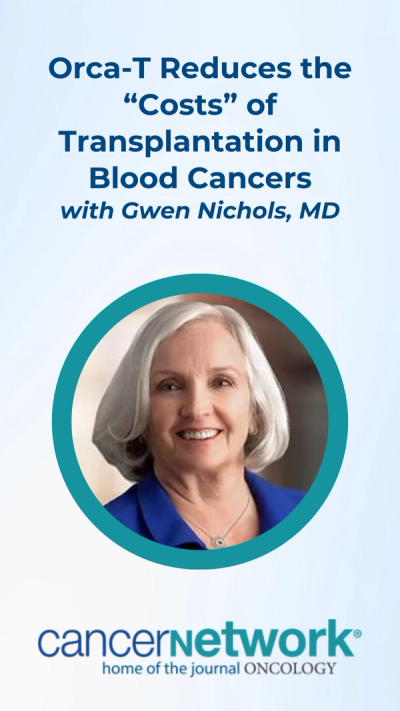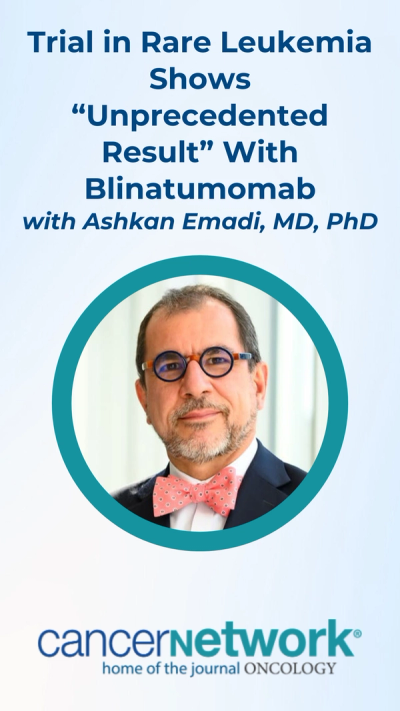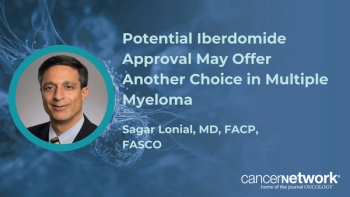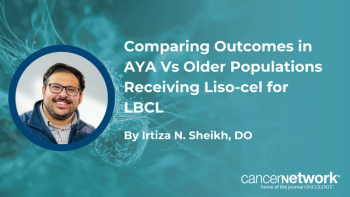Conference Coverage
Trending on CancerNetwork
Adding 177Lu-PSMA-617 to ADT Plus ARPI Improves Radiographic PFS in mHSPC
Potential Iberdomide Approval May Offer Another Choice in Multiple Myeloma
CHMP Recommends Pembrolizumab Regimen For Approval in Pretreated PROC
Enfortumab Vedotin Combo Boosts MIBC Survival Outcomes in EV-304 Trial
Examining Pembrolizumab Combo Safety in High-Risk Prostate Cancer
Latest News
Shorts










Podcasts

Navigating Depression in Cancer Care
Daniel C. McFarland, DO, and Boris Kiselev, MD, highlighted the need for oncologists to recognize and address depression for patients with cancer.

Reducing Disease Risk on National Cancer Prevention Month
Experts review strategies for effective screening and other measures for limiting cancer incidence in observance of National Cancer Prevention Month.

Decoding Key Community Oncology Takeaways From ASCO GI 2026
Experts review potential clinical advances highlighted at the 2026 ASCO Gastrointestinal Cancers Symposium.

From Cold to Hot: Navigating a New Frontier of Breast Cancer Immunotherapy
Sarah Poland, MD, explored the evolution of immunotherapy in breast cancer, including in triple-negative disease and HR+ and HER2+ subtypes.

International Perspectives in Prostate Cancer: A Look at Treatment in India
Experts discuss how issues related to prostate cancer diagnoses and access to care differ across practices based in the US and India.

What Were the Key Abstracts and Presentations at the 2026 Tandem Meetings?
Researchers and clinicians share key updates in leukemia, lymphoma, and myelodysplastic syndrome that they presented at the 2026 Tandem Meetings.

Spreading Radiation Oncology Advocacy and Education at ACRO Summit 2026
Experts outline current initiatives from the American College of Radiation Oncology as well as potential next steps for advancing the field.

Exploring the Bone Marrow Microenvironment’s Influence on NDMM Trajectory
The immune system is a “critical player” in the emergence and outcome of multiple myeloma, according to Manoj Bhasin, PhD, MS.

How to Responsibly Use AI in Palliative Care and Hematologic Malignancies
In palliative care, AI may serve as a supportive tool rather than a replacement of clinical judgment, said Ram Prakash Thirugnanasambandam, MBBS.

Screening, Prevention, and Intervention on Cervical Cancer Awareness Month
Experts discuss new modalities such as HPV vaccines, balancing hope with realism, and other considerations in cervical cancer management.
Videos
All News

Daniel C. McFarland, DO, and Boris Kiselev, MD, highlighted the need for oncologists to recognize and address depression for patients with cancer.

The majority of patients experiencing recurrence of their MIBC within 6 months of study start had high concentrations of ctDNA at baseline.

Several differences arise between community oncology centers and institutional oncology centers regarding the tools available and requirements of patients with cancer.

The triplet regimen also improved health-related quality of life and pain compared with ADT plus ARPI alone in patients with metastatic hormone-sensitive prostate cancer.

An effective regimen that partly incorporates oral therapy may be favorable from a patient convenience perspective, said Sagar Lonial, MD, FACP, FASCO.

SBRT was considered safe among patients with advanced renal cell carcinoma when added to the immunotherapy combination.

CAR T-cell therapies and T-cell engagers may produce an “exciting” benefit on the radiosensitization of prostate tumors.

Patrick Borgen, MD, discussed using ctDNA for “molecular interception” to de-escalate surgery and minimize AEs in biology-driven breast cancer care.

Based on findings from LITESPARK-11, belzutifan/lenvatinib may represent a new option in previously treated renal cell carcinoma.

The phase 2 study aimed to compare the safety of pembrolizumab and radiation with or without olaparib in this high-risk population.

Despite differences in treatment tolerance across different RCC subgroups, survival outcomes were similar in a retrospective study.

Data from PEACE-2 may challenge the current definition of "very high-risk" localized prostate cancer without nodal disease involvement.

Sarah Poland, MD, discussed the divergence between the IMpassion130 and IMpassion131 trials and the critical role of confirmatory trials in oncology.

Data from RETAIN-1 and RETAIN-2 show the chemoradiotherapy or BCG may remain viable options in those with ctDNA negativity but evidence of local disease.

Phase 3 data support perioperative enfortumab vedotin plus pembrolizumab as a novel treatment option in MIBC regardless of eligibility for cisplatin.

The expansion of clinical trials evaluating proton-based radiotherapy could elucidate its benefits and increase its access across the US.

Retrospective data show that relapse-free survival outcomes were worse for patients with MDS/MPN compared with those who had other types of MDS.

Often, patients in middle-income settings, are the patients who are impacted most by insurance deductibles, according to Loretta Nastoupil, MD.

Relacorilant plus nab-paclitaxel improved PFS among patients with PROC who had progression after a PARP inhibitor or who were 65 years or older.

Explore the latest clinical data and therapeutic strategies for acral, mucosal, and uveal melanomas from Mark B. Faries, MD, FACS.

Results from the PEACE-3 trial found an extended OS after patients with metastatic castration-resistant prostate cancer were treated with enzalutamide/radium-223.

Experts review strategies for effective screening and other measures for limiting cancer incidence in observance of National Cancer Prevention Month.

Data from the CAPItello-281 trial may support capivasertib/abiraterone as a first-in-class targeted therapy in this metastatic hormone-sensitive prostate cancer population.

Yan Leyfman, MD, reviewed how toxicity management in hematologic oncology is shifting to phenotype- and mechanism-informed intervention.

Data from the phase 2 BRCAAway trial showed the longest survival with olaparib plus abiraterone/prednisone vs each agent given alone or sequentially.

Loretta Nastoupil, MD, reflected on some of the differences between practicing in a rural, community cancer center compared with a larger institutional center.

The FDA approved zongertinib in HER2-mutated NSCLC as part of its Commissioner's National Priority Voucher pilot program.

Development of the oral DHX9 inhibitor, ATX-559, has been halted following adverse events in a phase 1/2 trial of patients with metastatic solid tumors.

The EGFR/HER3 bispecific ADC met the primary end points of PFS and OS in patients with advanced triple-negative breast cancer.

Decoding Key Community Oncology Takeaways From ASCO GI 2026
Experts review potential clinical advances highlighted at the 2026 ASCO Gastrointestinal Cancers Symposium.

Preliminary findings have shown an “unprecedented” result with blinatumomab in mixed phenotype acute leukemia, according to Ashkan Emadi, MD, PhD.

Sarah Poland, MD, discussed the transition of breast cancer from an "immunologically cold" tumor to a target for checkpoint inhibitors, highlighting the pivotal role of the KEYNOTE-012 trial.

Irtiza Sheikh, DO, sought to assess the impact of age and clinical setting on liso-cel efficacy in patients with large B-cell lymphoma.







































































